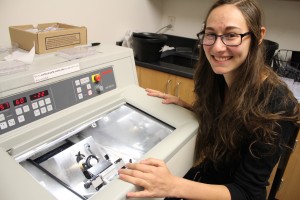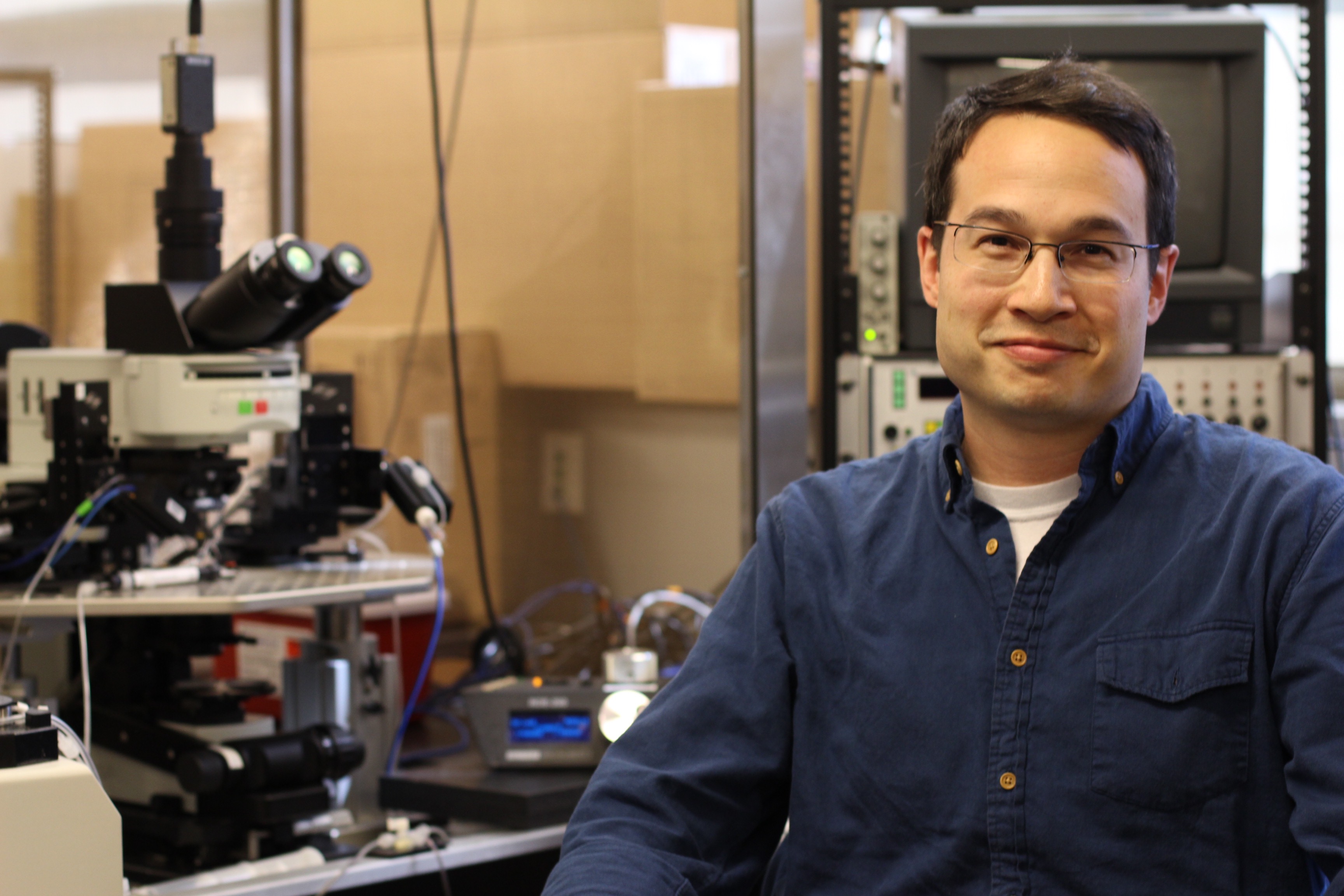Hunger, thirst, sleepiness, wakefulness, and a host of other essential bodily functions are all controlled by a small structure in our brains called the hypothalamus. This highly interconnected brain area is a vital link between the body’s nervous and endocrine systems, and is essential for survival.
Disruptions to neural pathways in this area of the brain are often implicated in chronic human health problems like sleep disorders, obesity, stress and diabetes.

Now, UConn Assistant Professor of Physiology and Neurobiology Alexander Jackson is tackling these neural pathways, using electrical recordings and a recently developed technique called optogenetics to control individual brain cells with light. Jackson and his students are shedding light – literally – on how neurons in the hypothalamus control fundamental aspects of physiology and behavior.
It’s part of growing momentum at UConn to understand the intricate workings of the brain, beginning at the cellular level and extending to cognitive function.
“Finally, we have access to a rapidly expanding toolbox of powerful new techniques to really crack open and explore the cellular and molecular underpinnings of brain structure and function in unprecedented detail,” says Jackson. “Neurons and the connections between them are the fundamental building blocks of who we are.”
Mind under the microscope
The hypothalamus has been a challenging region of the brain to study, says Jackson, due in part to its exceptionally diverse, intermingled cell populations, and the complex pathways they use to communicate with other brain regions.
Jackson’s recent work, which began when he arrived at UConn in 2013, focuses on the
lateral hypothalamus, a small but critically important region that controls sleep and appetite, among other functions.
“As small as it is, disruptions in neural circuits in the lateral hypothalamus can profoundly affect our health and well-being – so even small populations of neurons found here can have a huge impact on us,” said Jackson.
Advances in mouse genetics, optogenetics, and other tools, he says, help his team to see and control how specific populations of neurons talk to one another. Optogenetic tools allow them to selectively activate or silence genetically-defined cells using pulses of light.
With millisecond precision, team members can then examine the patterns of connections between neurons in mouse brain slices, and listen in on their synaptic conversations.
“What’s fascinating about neurons in the lateral hypothalamus is that their electrical excitability can drive changes in behavioral state. So arousal, hunger, or stress may be represented by changes in firing patterns,” says Jackson. “We’re interested in how this electrical activity may be cranked up or dampened by their communication with other neurons, near and far.”
The neural building blocks
Miryam Wilson (CLAS ’15), a physiology and neurobiology major and now a first-year student at the UConn School of Medicine, spent her junior and senior years doing research in Jackson’s lab as part of her honors thesis project.

(Christine Buckley/UConn Photo)
Wilson was intrigued by the idea that even a small population of neurons could have such a profound impact on human health. In her research, she did an anatomical characterization of two genetically-modified mouse lines that label a specific population of hypothalamic neurons, which regulate sleep and wakefulness. These mice were engineered to express a fluorescent protein in a specific cell population that allows their identification under a microscope.
Her work involved creating thin sections of frozen mouse brain tissue, staining them with antibodies and imaging them with a special confocal microscope that allows for increased optical resolution. The cellular mechanisms underlying the function of these neurons are important, says Jackson, as they control fundamental behavioral states, like sleep, and could be a potential target for therapies to treat sleep disorders and neuropsychiatric illness.
Her project laid the groundwork for further research in the lab, using these transgenic mice for electrical recording and optogenetic control of their activity, he says.
It also helped to earn Wilson the Margaret F. Ertman Award – the most prestigious award given to a UConn senior studying the biological sciences. She credits Jackson’s leadership as integral in her current successful path.
“Dr. Jackson is a great teacher who knows when to guide, and when to let you figure things out on your own,” Wilson said. “Working in the lab helped me improve and develop my analytical thinking abilities, which will be critical for success in medical school.”
Advancing neuroscience research at UConn
The opportunity for undergraduates to take on this type of graduate-level research is one of the many things that makes UConn unique, says Joe LoTurco, Professor of Physiology and Neurobiology and Associate Director of the new Connecticut Institute for the Brain and Cognitive Sciences at UConn.
“It’s an exciting time for brain research at UConn,” LoTurco says. “It’s through cellular research that we begin to truly understand the language of the brain, and how neurotransmission between cells can affect the way we think, the way we learn, the way we function–the way we do pretty much everything.”
Jackson’s work has earned him a three-year Pathway to Independence Award from the National Institute of Mental Health, a highly competitive research award that supports the work of promising post-doctoral researchers in their first years as tenure-track professors.
He says UConn is a fertile place to do neuroscience research, citing excellent colleagues and students and access to interdisciplinary resources as drivers of his own continued research success.
“Basic neuroscience research is so important in laying the foundation for our understanding of brain function, which will pave the way to illuminating how these mechanisms go awry in disease,” he says.



